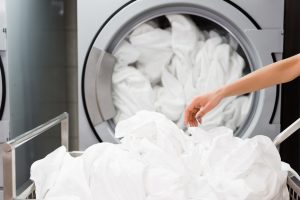
Wetting the bed is usually associated with young children. However, bed-wetting can also occur in adulthood – especially if you are affected by sleep apnea. Waking up to damp bedsheets can be majorly embarrassing! Fortunately, an experienced dentist can help you overcome your sleep disorder and common symptoms. Keep reading to learn more about sleep apnea, why it sometimes causes adult bed-wetting, and how to treat it.
What Is Sleep Apnea?
Sleep apnea is a common sleep disorder that temporarily stops a person’s breathing dozens or even hundreds of times a night. If left untreated, sleep apnea can contribute to a wide range of serious health problems, such as high blood pressure, diabetes, stroke, heart attacks, and more.
Approximately 22 millions American suffer from sleep apnea. There are two main types of the sleep disorder:
- Obstructive sleep apnea – The muscles in the back of the throat relax and block the airway. This is the most common form of sleep apnea.
- Central sleep apnea – The brain fails to send signals to the muscles in the throat and upper body responsible for breathing.
How Is Sleep Apnea Linked to Adult Bed-Wetting?
When sleep apnea disrupts the flow of oxygen, the brain has to work extra hard to keep the body functioning. Bladder control quickly slips down the list of priorities as the brain instead focuses on maintaining proper oxygen levels. According to research published in the Western Journal of Medicine, approximately 7% percent of people with sleep apnea experience bed-wetting.
Even if you do not accidentally wet the bed, you are likely waking up many times each night to use the bathroom if you have sleep apnea. According to the American Sleep Apnea Association, over 80% of all sleep apnea patients in a recent study reported frequent nighttime urination.
How to Treat Sleep Apnea
One traditional way of treating sleep apnea is with a continuous positive airway pressure (CPAP) machine. This common sleep disorder device utilizes a mask and air pump to maintain airflow through the throat during the night. Although effective, many people have trouble adjusting to sleeping while wearing the CPAP mask.
Fortunately, many experienced sleep dentists now offer convenient alternatives!
Oral Appliance Therapy
Oral appliance therapy involves wearing a small custom-made mouthpiece that repositions the jaw to prevent airway blockage while you sleep.
Vivos
The Vivos Daytime-Nighttime Appliance system, meanwhile, actually expands a person’s palate over time. By gradually improving the structure of your airway, the Vivos system can stop your sleep apnea for good.
Consistently get a good night’s sleep and avoid embarrassing episodes of bed-wetting by talking to your dentist about sleep apnea therapy today.
About the Author
During her 30-plus years of practicing dentistry, Dr. Pamela West has trained extensively in treating sleep apnea. She is an active member of the American Academy of Sleep Medicine and offers sleep apnea therapy options for adults and children alike at Summerlin Center for Aesthetic Dentistry. To learn more about how to overcome sleep apnea, visit the Summerlin Center for Aesthetic Dentistry website or call 702-844-6224.
